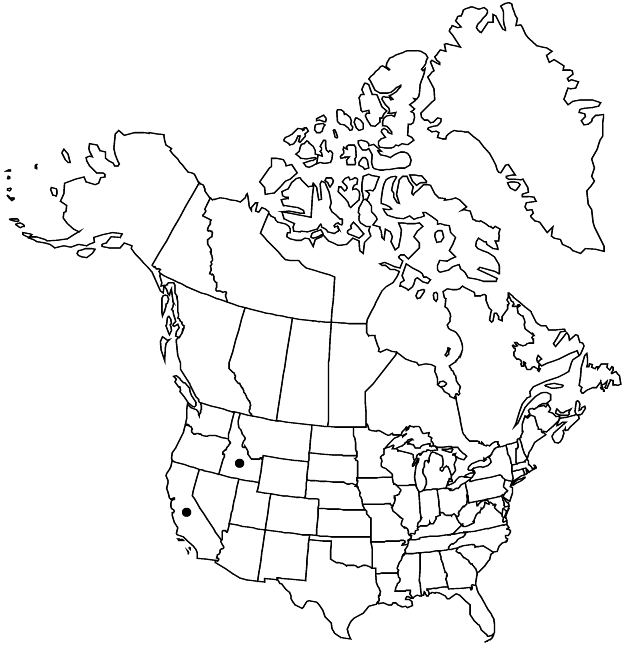Difference between revisions of "Eriogonum inerme"
Fl. Calif. 1: 406. 1914.
FNA>Volume Importer |
imported>Volume Importer |
||
| (4 intermediate revisions by one other user not shown) | |||
| Line 7: | Line 7: | ||
|year=1914 | |year=1914 | ||
}} | }} | ||
| − | |basionyms={{Treatment/ID/ | + | |special_status={{Treatment/ID/Special_status |
| + | |code=E | ||
| + | |label=Endemic | ||
| + | }} | ||
| + | |basionyms={{Treatment/ID/Basionym | ||
|name=Oxytheca inermis | |name=Oxytheca inermis | ||
|authority=S. Watson | |authority=S. Watson | ||
| + | |rank=species | ||
| + | |publication_title=Proc. Amer. Acad. Arts | ||
| + | |publication_place=12: 273. 1877 | ||
}} | }} | ||
|synonyms= | |synonyms= | ||
| Line 46: | Line 53: | ||
-->{{#Taxon: | -->{{#Taxon: | ||
name=Eriogonum inerme | name=Eriogonum inerme | ||
| − | |||
|authority=(S. Watson) Jepson | |authority=(S. Watson) Jepson | ||
|rank=species | |rank=species | ||
| Line 57: | Line 63: | ||
|publication title=Fl. Calif. | |publication title=Fl. Calif. | ||
|publication year=1914 | |publication year=1914 | ||
| − | |special status= | + | |special status=Endemic |
| − | |source xml=https:// | + | |source xml=https://bitbucket.org/aafc-mbb/fna-data-curation/src/2e0870ddd59836b60bcf96646a41e87ea5a5943a/coarse_grained_fna_xml/V5/V5_852.xml |
|subfamily=Polygonaceae subfam. Eriogonoideae | |subfamily=Polygonaceae subfam. Eriogonoideae | ||
|genus=Eriogonum | |genus=Eriogonum | ||
Latest revision as of 22:14, 5 November 2020
Herbs, spreading, annual, 0.5–3 dm, glandular, greenish or reddish. Stems: caudex absent; aerial flowering stems mostly erect, solid, not fistulose, 0.1–0.5 dm, glandular. Leaves basal and cauline; basal: petiole 0.5–2 cm, glabrous, not or indistinctly winged, ciliate, blade spatulate, 1–4(–4.5) × 0.4–1.5(–1.8) cm, glabrous, margins ciliate; cauline sessile, blade lanceolate, 0.3–1 × 0.1–0.3 cm, similar to basal blade. Inflorescences cymose, open or diffuse, 5–25 × 5–30 cm; branches glandular; bracts 3, scalelike, 0.5–1.5 × 1–2 mm, occasionally semileaflike, 4–10(–12) × 1–5 mm. Peduncles absent or erect, straight, slender, 0.1–1 cm, glandular. Involucres turbinate, 1.5–1.9 × 1–1.2 mm, glabrous or hispidulous; teeth 4, erect or nearly so, 0.8–1.2 mm. Flowers 4–6, 1.2–1.8 mm; perianth pink to reddish, hirsutulous with stiff, white, hooked hairs; tepals monomorphic, oblong; stamens included, 1–1.5 mm; filaments glabrous. Achenes brown, lenticular, 1.5–1.9 mm, glabrous; beak not exserted beyond tepals.
Distribution

Calif., Idaho.
Discussion
Varieties 2 (2 in the flora).
Selected References
None.
Key
| 1 | Involucres glabrous; Coast and Transverse ranges, California, disjunct in Boise County, Idaho | Eriogonum inerme var. inerme |
| 1 | Involucres hispidulous; Transverse Ranges and s Sierra Nevada, disjunct in Tuolumne County, California | Eriogonum inerme var. hispidulum |